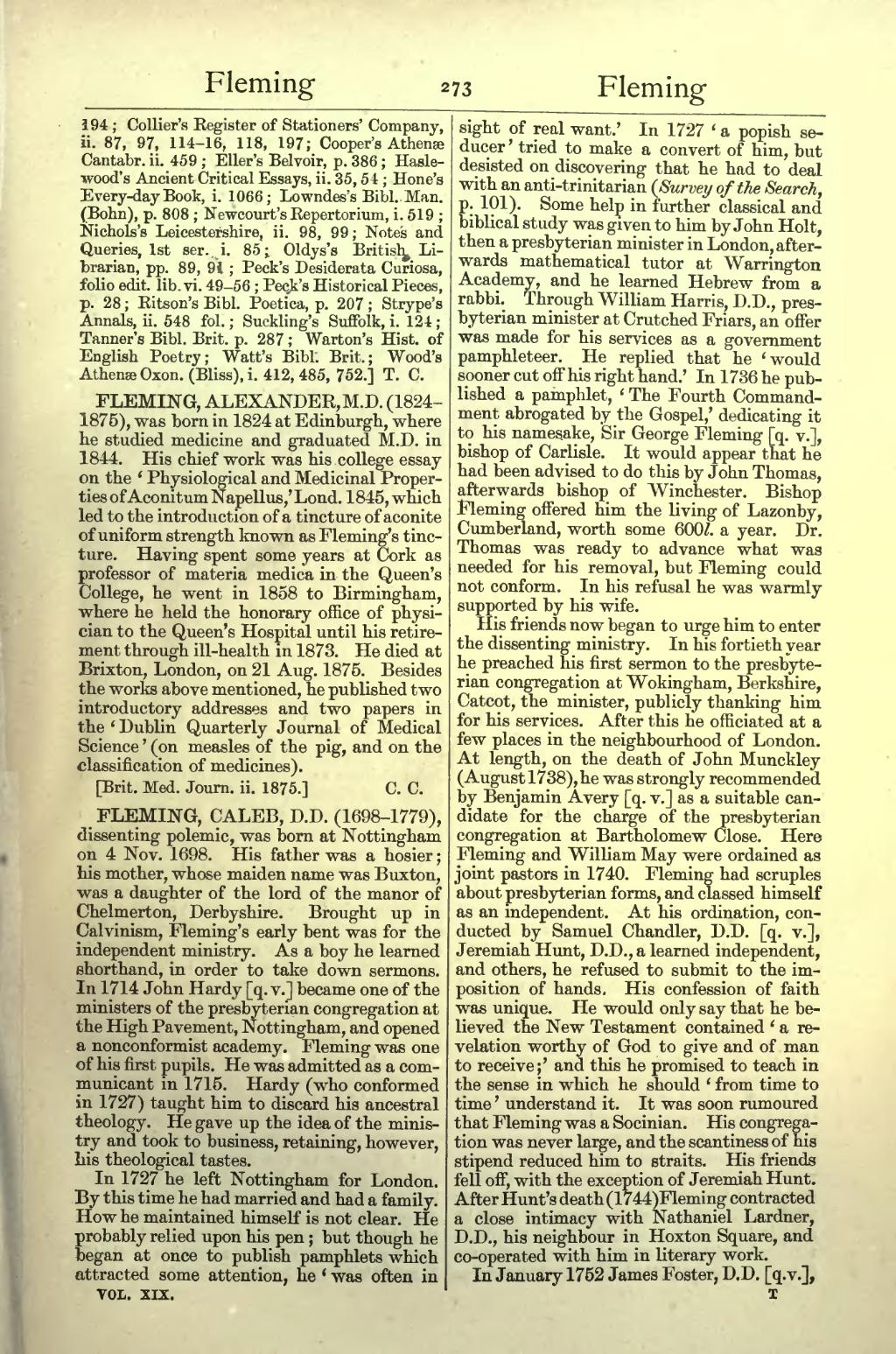FLEMING, ALEXANDER, M.D. (1824–1875), was born in 1824 at Edinburgh, where he studied medicine and graduated M.D. in 1844. His chief work was his college essay on the 'Physiological and Medicinal Properties of Aconitum Napellus,' Lond. 1845, which led to the introduction of a tincture of aconite of uniform strength known as Fleming's tincture. Having spent some years at Cork as professor of materia medica in the Queen's College, he went in 1858 to Birmingham, where he held the honorary office of physician to the Queen's Hospital until his retirement through ill-health in 1873. He died at Brixton, London, on 21 Aug. 1875. Besides the works above mentioned, he published two introductory addresses and two papers in the 'Dublin Quarterly Journal of Medical Science' (on measles of the pig, and on the classification of medicines).
[Brit. Med. Journ. ii. 1875.]
FLEMING, CALEB, D.D. (1698–1779), dissenting polemic, was born at Nottingham on 4 Nov. 1698. His father was a hosier; his mother, whose maiden name was Buxton, was a daughter of the lord of the manor of Chelmerton, Derbyshire. Brought up in Calvinism, Fleming's early bent was for the independent ministry. As a boy he learned shorthand, in order to take down sermons. In 1714 John Hardy [q. v.] became one of the ministers of the presbyterian congregation at the High Pavement, Nottingham, and opened a nonconformist academy. Fleming was one of his first pupils. He was admitted as a communicant in 1715. Hardy (who conformed in 1727) taught him to discard his ancestral theology. He gave up the idea of the ministry and took to business, retaining, however, his theological tastes.
In 1727 he left Nottingham for London. By this time he had married and had a family. How he maintained himself is not clear. He probably relied upon his pen; but though he began at once to publish pamphlets which attracted some attention, he 'was often in sight of real want.' In 1727 'a popish seducer' tried to make a convert of him, but desisted on discovering that he had to deal with an anti-trinitarian (Survey of the Search, p. 101). Some help in further classical and biblical study was given to him by John Holt, then a presbyterian minister in London, afterwards mathematical tutor at Warrington Academy, and he learned Hebrew from a rabbi. Through William Harris, D.D., presbyterian minister at Crutched Friars, an offer was made for his services as a government pamphleteer. He replied that he 'would sooner cut off his right hand.' In 1736 he published a pamphlet, 'The Fourth Commandment abrogated by the Gospel,' dedicating it to his namesake, Sir George Fleming [q. v.], bishop of Carlisle. It would appear that he had been advised to do this by John Thomas, afterwards bishop of Winchester. Bishop Fleming offered him the living of Lazonby, Cumberland, worth some 600l. a year. Dr. Thomas was ready to advance what was needed for his removal, but Fleming could not conform. In his refusal he was warmly supported by his wife.
His friends now began to urge him to enter the dissenting ministry. In his fortieth year he preached his first sermon to the presbyterian congregation at Wokingham, Berkshire, Catcot, the minister, publicly thanking him for his services. After this he officiated at a few places in the neighbourhood of London. At length, on the death of John Munckley (August 1738), he was strongly recommended by Benjamin Avery [q. v.] as a suitable candidate for the charge of the presbyterian congregation at Bartholomew Close. Here Fleming and William May were ordained as joint pastors in 1740. Fleming had scruples about presbyterian forms, and classed himself as an independent. At his ordination, conducted by Samuel Chandler, D.D. [q. v.], Jeremiah Hunt, D.D., a learned independent, and others, he refused to submit to the imposition of hands, His confession of faith was unique. He would only say that he believed the New Testament contained 'a revelation worthy of God to give and of man to receive;' and this he promised to teach in the sense in which he should 'from time to time' understand it. It was soon rumoured that Fleming was a Socinian. His congregation was never large, and the scantiness of his stipend reduced him to straits. His friends fell off, with the exception of Jeremiah Hunt. After Hunt's death (1744) Fleming contracted a close intimacy with Nathaniel Lardner, D.D., his neighbour in Hoxton Square, and co-operated with him in literary work.
In January 1752 James Foster, D.D. [q.v.],
